Eyelid retraction is a condition where the upper or lower eyelid is positioned abnormally high or low, exposing more of the eye than normal. This can lead to functional and cosmetic issues, as well as potential damage to the eye due to inadequate protection. Eyelid retraction is often associated with underlying medical conditions and requires prompt diagnosis and treatment.
Thyroid Eye Disease (Graves' Disease): The most common cause, where inflammation and swelling of the eye muscles and tissues pull the eyelid upward.
Congenital Factors: Rarely, eyelid retraction may be present from birth due to abnormal eyelid development.
Trauma or Surgery: Injuries or previous surgeries around the eye can alter eyelid position.
Neurological Disorders: Conditions affecting the facial nerves, such as Bell’s palsy, can cause eyelid retraction.
Tumors or Masses: Growths around the eye can push or pull the eyelid out of its normal position.
Medication Side Effects: Certain medications may affect eyelid muscles, leading to retraction.
Abnormal eyelid position (upper lid too high or lower lid too low),
Dryness and irritation due to increased exposure of the eye,
Sensitivity to light (photophobia),
Redness and swelling around the eye,
A staring or surprised appearance,
Blurred vision or double vision (if the cornea is affected).
Corneal Damage: Increased exposure can lead to dryness, abrasions, or ulcers.
Eye Infections: Lack of proper eyelid closure increases the risk of infections.
Cosmetic Concerns: The abnormal appearance can affect self-esteem and social interactions.
Thyroid Eye Disease: Treatment by an endocrinologist to regulate thyroid function.
Infections or Inflammation: Antibiotics or anti-inflammatory medications.
Tumors: Surgical removal or other treatments as needed.
Artificial tears or lubricating ointments to prevent dryness.
Protective eyewear to shield the eye from environmental irritants.
Eyelid Surgery: Repositioning the eyelid to its normal state. This may involve releasing tight muscles or adding support to the eyelid.
Orbital Decompression Surgery: For severe cases related to thyroid eye disease, this procedure reduces pressure around the eye.
Temporary relief by relaxing overactive muscles causing the retraction.
Regular eye exams to detect and address issues early.
Prompt treatment of underlying conditions like thyroid disorders.
Protecting the eyes from trauma or injury.
Turkey is a leading destination for the diagnosis and treatment of eyelid retraction, offering high-quality medical care at competitive prices. The country is known for its advanced healthcare infrastructure, experienced specialists, and affordable treatment options.
Turkey has a pool of highly skilled ophthalmologists and oculoplastic surgeons specializing in eyelid disorders.
Specialists like Op. Dr. Ayşe Dolar Bilge provide personalized and effective treatment plans.
State-of-the-art medical equipment and techniques are widely available.
Minimally invasive surgical options ensure faster recovery and better outcomes.
Treatment in Turkey is cost-effective compared to many Western countries, without compromising on quality.
Transparent pricing and comprehensive packages for international patients.
Many hospitals offer all-inclusive packages for international patients, including treatment, accommodation, and translation services.
Turkey’s strategic location makes it easily accessible for patients from Europe, Asia, and the Middle East.
A thorough clinical examination by an ophthalmologist.
Imaging tests (if needed) to evaluate the underlying cause of eyelid retraction.
Eyelid Repositioning Surgery: The most common procedure, where the eyelid is adjusted to its normal position.
Orbital Decompression Surgery: For severe cases related to thyroid eye disease.
Surgery is performed under local or general anesthesia, depending on the patient’s condition.
Patients are monitored closely after surgery to ensure proper healing.
Follow-up appointments are scheduled to assess the results and address any concerns.
High success rates and minimal complications.
Comprehensive care from diagnosis to recovery.
Affordable and transparent pricing.
Support for international patients, including language assistance and travel arrangements.
Research and choose a reputable clinic or hospital with experienced specialists.
Discuss all treatment options with your doctor to understand the benefits and risks.
If traveling to Turkey for treatment, plan your trip in advance and ensure you have all necessary medical records.
Eyelid retraction is a condition that can significantly impact eye health and quality of life. Early diagnosis and appropriate treatment are essential to prevent complications such as corneal damage. Turkey, with its advanced medical infrastructure, skilled specialists, and affordable costs, is an excellent destination for eyelid retraction treatment. Whether you are a local or an international patient, Turkey offers world-class care to restore eyelid function and improve your overall eye health. If you suspect you have eyelid retraction, consult an ophthalmologist promptly to explore your treatment options.
